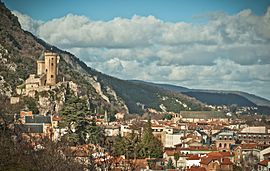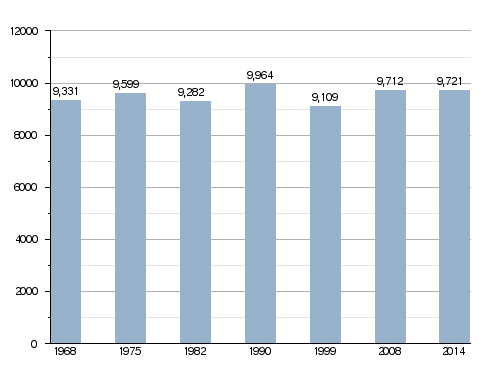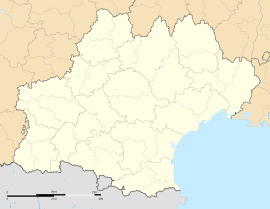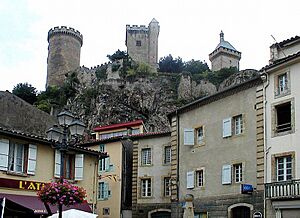Foix facts for kids
Quick facts for kids
Foix
|
|||
|---|---|---|---|
|
Prefecture and commune
|
|||

View of Chateau de Foix in Lazema area
|
|||
|
|||
| Country | France | ||
| Region | Occitanie | ||
| Department | Ariège | ||
| Arrondissement | Foix | ||
| Canton | Foix | ||
| Intercommunality | Pays Foix-Varilhes | ||
| Area
1
|
19.32 km2 (7.46 sq mi) | ||
| Population
(2014)
|
9,721 | ||
| • Density | 503.16/km2 (1,303.2/sq mi) | ||
| Demonym(s) | Fuxéen | ||
| Time zone | UTC+01:00 (CET) | ||
| • Summer (DST) | UTC+02:00 (CEST) | ||
| INSEE/Postal code |
09122 /09000
|
||
| Elevation | 358–933 m (1,175–3,061 ft) (avg. 400 m or 1,300 ft) |
||
| Website | www.mairie-foix.fr | ||
| 1 French Land Register data, which excludes lakes, ponds, glaciers > 1 km2 (0.386 sq mi or 247 acres) and river estuaries. | |||
Foix (Occitan: Fois; Catalan: Foix) is a town in southwestern France. It used to be the main city of the County of Foix. Today, it is the capital (called a "préfecture") of the Ariège department in the Occitanie region.
Foix is located south of Toulouse, close to the border with Spain and Andorra. It is the second-largest town in its department, after Pamiers. Foix is also the smallest capital city (préfecture) in all of France, based on its population.
Contents
History of Foix
The Romans built a strong fort on the rocky hill where the famous Château de Foix castle now stands. This castle overlooks the town. The town of Foix likely started around a small church built by Charlemagne.
This church later became the Abbey of Saint Volusianus in the year 849. The area where the department is today was once part of the old County of Foix.
Geography of Foix
Foix is located at the base of the Pyrenees mountains in southern France. It sits where two rivers, the Ariège and the Arget, meet. Foix is about 83 kilometers (52 miles) south of Toulouse.
The town covers an area of about 19.3 square kilometers (7.5 square miles). Its average height above sea level is 646 meters (2,119 feet). At the town hall, the height is 380 meters (1,247 feet).
Foix is surrounded by several other towns. These include Arabaux, Cos, Crampagna, Ferrières-sur-Ariège, Ganac, Montgaillard, Pradières, Saint-Jean-de-Verges, Saint-Pierre-de-Rivière, and Vernajoul.
Climate in Foix
Foix has an Oceanic climate with mild summers. This type of climate is known as Cfb in the Köppen climate classification system.
Population of Foix
The people who live in Foix are called Fuxéens (for men) and Fuxéennes (for women) in French.
In 2014, Foix had a population of 9,721 people. This means there were about 503 inhabitants per square kilometer.
Evolution of the population in Foix

Foix and five nearby towns form the "urban area" of Foix. In 2013, this area had 14,552 people and covered 75.8 square kilometers (29.3 square miles). This urban area is the center of the larger "metropolitan area" of Foix. This bigger area includes 17 towns, with 18,406 people and an area of 213.0 square kilometers (82.2 square miles) in 2013.
Administration of Foix
Foix is the "préfecture" (capital city) of the Ariège department. It is also the main town of the arrondissement of Foix. An arrondissement is like a district within a department. Foix is also the administrative center (called a chef-lieu) of the canton of Foix. A canton is a smaller area used for elections. In 2014, the canton of Foix had 13,700 people.
Foix is part of a group of towns that work together, called an "intercommunality." This group is named Pays Foix-Varilhes.
Sister Cities
Foix has special partnerships with other cities around the world. These are called "twinned" or "partner" towns.
Places to Visit in Foix
- The most important historical building is the Castle of the Counts of Foix, often just called Castle of Foix. It sits high on a rocky hill, looking over the city.
- The old town of Foix has narrow streets and traditional houses. It's a great place to explore.
- The Saint-Volusien Abbey is another historic site. An abbey is a type of monastery, a place where monks or nuns live.
- The Villote (meaning "small town") was an open space outside the city walls in the Middle Ages. It was built around 1330.
Gallery
Related pages
See also
 In Spanish: Foix para niños
In Spanish: Foix para niños










